E-Pluribus | June 13, 2024
The illiberality of draconian law enforcement; watch your language (you racist!); and if at first you don't succeed...give up?
A round-up of the latest and best musings on the rise of illiberalism in the public discourse:
Billy Binion: It Is Illiberal To Charge Teens With Felonies for Vandalizing a Pride Crosswalk
Earlier this week, I noted on Twitter a contrast in law enforcement responses to two incidents of vandalism. Billy Binion at Reason weighs in on one of the cases and argues that the response makes no sense any way you look at it.
Three teenagers were arrested last week for allegedly vandalizing a Pride crosswalk in Spokane, Washington, by running scooters over the mural to create skid marks.
[. . .]
Is there any proof the teens were being intolerant, or is this a misunderstanding (especially when considering the mural is on a road, where people are indeed expected to drive)? When confronted by a bystander, one teen reportedly responded with "Fuck you, faggot." That would seem fairly instructive.
Yet in terms of the second prong, the question "Was this a victimless crime?" is almost hard to take seriously, because of course it was. Might it have caused hurt feelings? Sure. But no matter how unsavory the teens' actions, we shouldn't be prosecuting people for hurting feelings.
[. . .]
City Council President Betsy Wilkerson, who ran in a nonpartisan race but is a Democrat who identifies as a progressive, announced that she was working in tandem with the Spokane police to bolster surveillance in the area. "I know it was called vandalism," she said, "but it was hate."
Such incidents could very well be fueled by hatred. But we do not jail people for having bigoted views. And at least in the case of the Spokane teens, one wonders what their potential incarceration—first degree criminal mischief is a class B felony carrying a sentence up to 10 years in prison—does to improve public safety.
Vandalism, of course, is wrong. So is calling anyone a slur. These things shouldn't need to be said. But if Spokane officials want to change the minds of prejudiced people, there are few approaches more counterproductive and illiberal than locking them up.
Read it all.
Wenyuan Wu: ‘Linguistic White Supremacy’: The Left’s New Crusade Against the English Language
When learning a new language, it is easy to create awkward situations by mispronouncing or misusing a word. But today, English speakers are just as apt to run into trouble in their native language according to the standards set by the new language police, writes Wenyuan Wu at Minding the Campus.
The U.S. academia has now concocted an absurd proposition that speaking and writing proper English is a form of white supremacy. The term is “Linguistic White Supremacy (LWS)” or “White Language Supremacy (WLS),” depending on where you look.
According to the Conference on College Composition and Communication (CCCC), a membership-based professional association for “diverse communicators inside and outside of postsecondary classrooms,”
WLS assists white supremacy by using language to control reality and resources by defining and evaluating people, places, things, reading, writing, rhetoric, pedagogies, and processes in multiple ways that damage our students and our democracy. It imposes a worldview that is simultaneously pro-white, cisgender, male, heteronormative, patriarchal, ableist, racist, and capitalist … WLS is, thus, structural and usually a part of the standard operating procedures of classrooms, disciplines, and professions…WLS perpetuates many forms of systemic and structural violence.
CCC goes on to outline the characteristics of WLS as “habits of white language,” including: “individualism,” “stance of neutrality, objectivity, and apoliticality,” “rational, controlled self,” “rule-governed, contractual relationships,” “clarity, order, and control.” In other words, good virtues and values, with roots in the Age of the Enlightenment, are just learned habits of white supremacists.
[. . .]
The irony is not lost when subscribers to the antiracism dogma can’t live up to their own expectations. Recently, my colleague—also a Chinese immigrant—mispronounced the Spanish last name “Jimenez” at a local school board meeting when he publicly commented on academic transparency and accountability. Instead of showing tolerance towards this linguistic mistake, the school board’s most progressive trustee immediately mocked my colleague.
Read it all here.
Craig Clifford: Courage and Self-Care
The popular old folk tale The Little Engine That Could might be retold in the present day as The Little Engine That Had The Courage To Admit He Wasn’t Quite Up To It. While acknowledging that perhaps the reality and impact of stress were given short shrift too often in the past, Craig Clifford writing at Quillette can’t help wondering if the pendulum has swung too far in the opposite direction.
Counselling centres at universities used to help students with test anxiety and other education-related issues; now they are flooded with students who need help with their mental health. Of course, this is a boon for Student Services divisions that want to expand their empires, and it fits the narrative that universities should educate the “whole person.” As wonderful as that sounds, it is part of a process that devalues what students actually learn in classes.
But let’s look beyond the Ivy-covered bubble of our college campus, which recent events have shown—at least at many of the elite American universities—to be havens of pampered self-indulgence. Even among high-profile, highly competitive people who routinely have to deal with incredible stress in their chosen career, the focus now is often on their mental well-being, rather than their participation and their achievements in their competitive activity.
[. . .]
Maybe in the past we were not compassionate enough, and maybe more attention should be paid to the mental toll of high-level athletics on young girls in sports like gymnastics and figure skating. Sometimes coaches and parents expect too much—there is a fine line between legitimately high expectations and abuse. And, yes, there are real cases of mental illness, and in the past we may have been reluctant to face that issue. But we seem to have overcorrected.
After almost a half century of reading and teaching Plato’s dialogues, I can’t help but ask “What would Socrates do?” He would undoubtedly say to the purveyors of mental health: “Since you defend what you’re doing by referring to mental health, you must know what mental health is. So, tell me: What is mental health? What is mental well-being?”
Today, it seems to mean exiting a stressful situation. Isn’t mental well-being seen this way a negative concept—the absence of pressure or stress? Is there any content to this well-being other than the absence of stress? Hedonists believe that the goal of a human life is pleasure; now we seem to believe that it’s the absence of mental pain. Athletes saying no to pressure is part of a larger narrative—the narrative in which everyone is entitled to freedom from offensive speech, harassment, and microaggressions. This conception of a good society—one in which everyone is free of stress—is vacuous.
[. . .]
When we say “sports build character,” the word “character” means something very close to the classical concept of virtue. The cardinal classical virtues are courage, self-control, justice, and wisdom. What I should aim for is not to be free from harmful stress, but to be just, self-controlled, courageous, and wise. Aristotle said that our goal in life should not be a state of mind, but “activity of the soul in accord with virtue.” In other words, living a virtuous life—a courageous, self-controlled, just, and wise life. The narrative of safe spaces and choosing personal mental well-being over all else aims at a state of mind, but it’s not even a positive state of mind; it’s a state of mind free from adversity, offence, pressure, stress, and anxiety.
Read the whole thing.
Around Twitter (X)
The Foundation for Individual Rights and Expression is drawing attention to one of the lesser known Supreme Court 1st Amendment decisions:
From Japanese business executive Takashi Fuchigami, a short thread on Jacob Mchangama’s book, Free Speech: A History from Socrates to Social Media (in case you couldn’t read the cover in the photo):
And finally, Colin Wright with the latest on Lia Thomas’s attempt to compete in women’s swimming at the Olympics, via the New York Post:



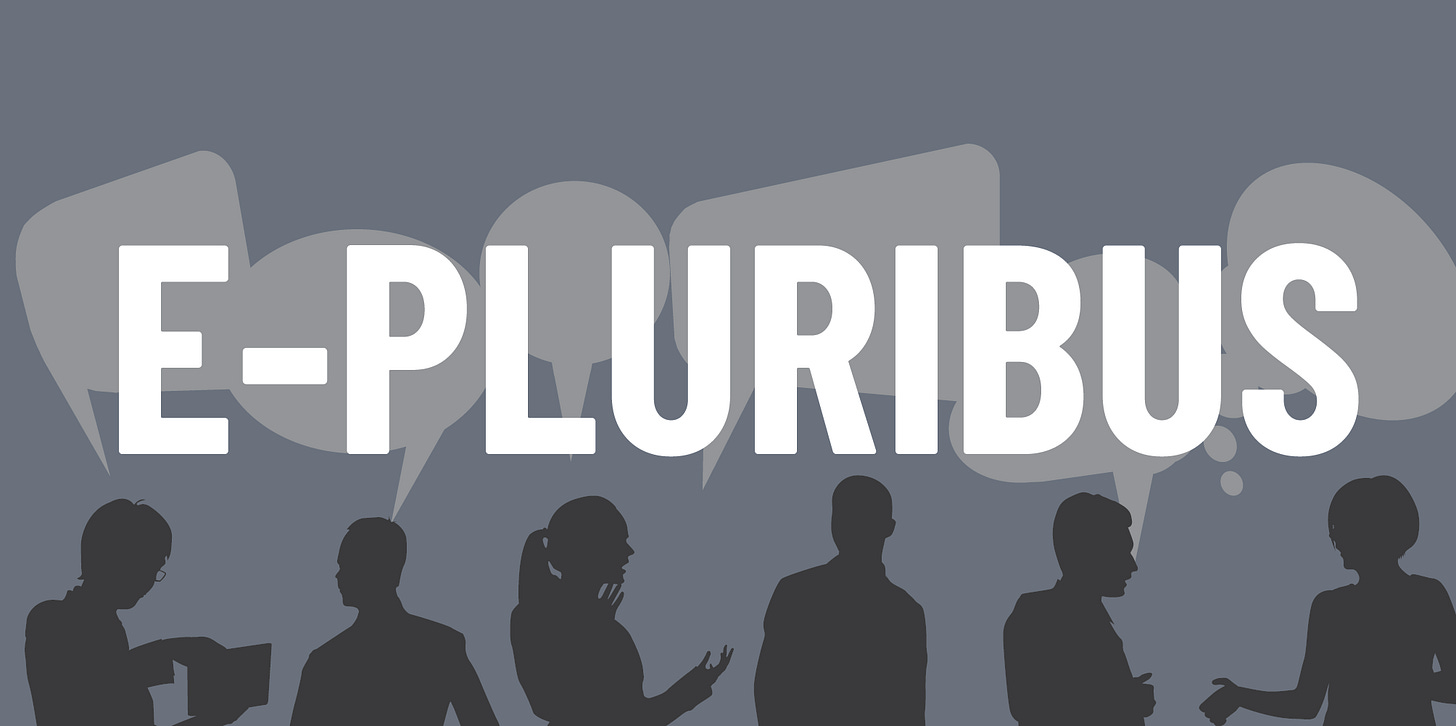

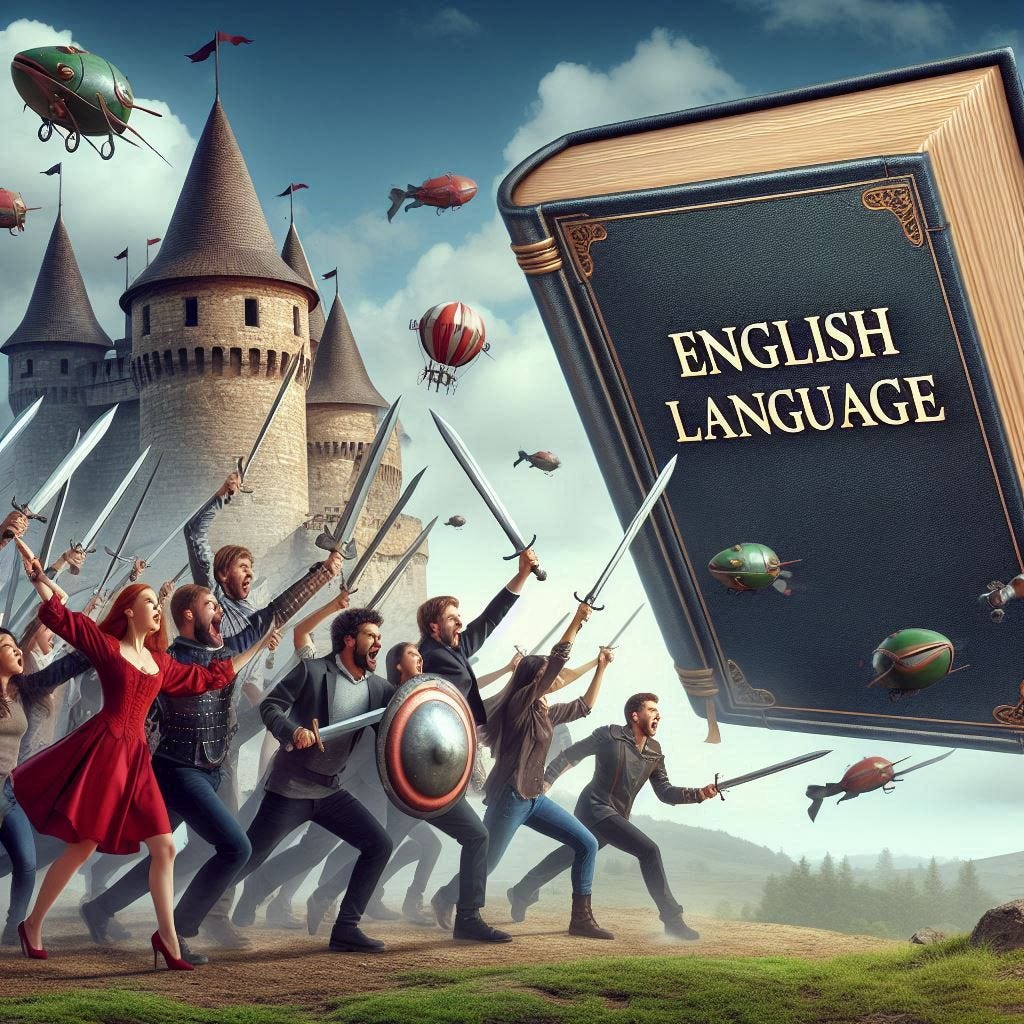
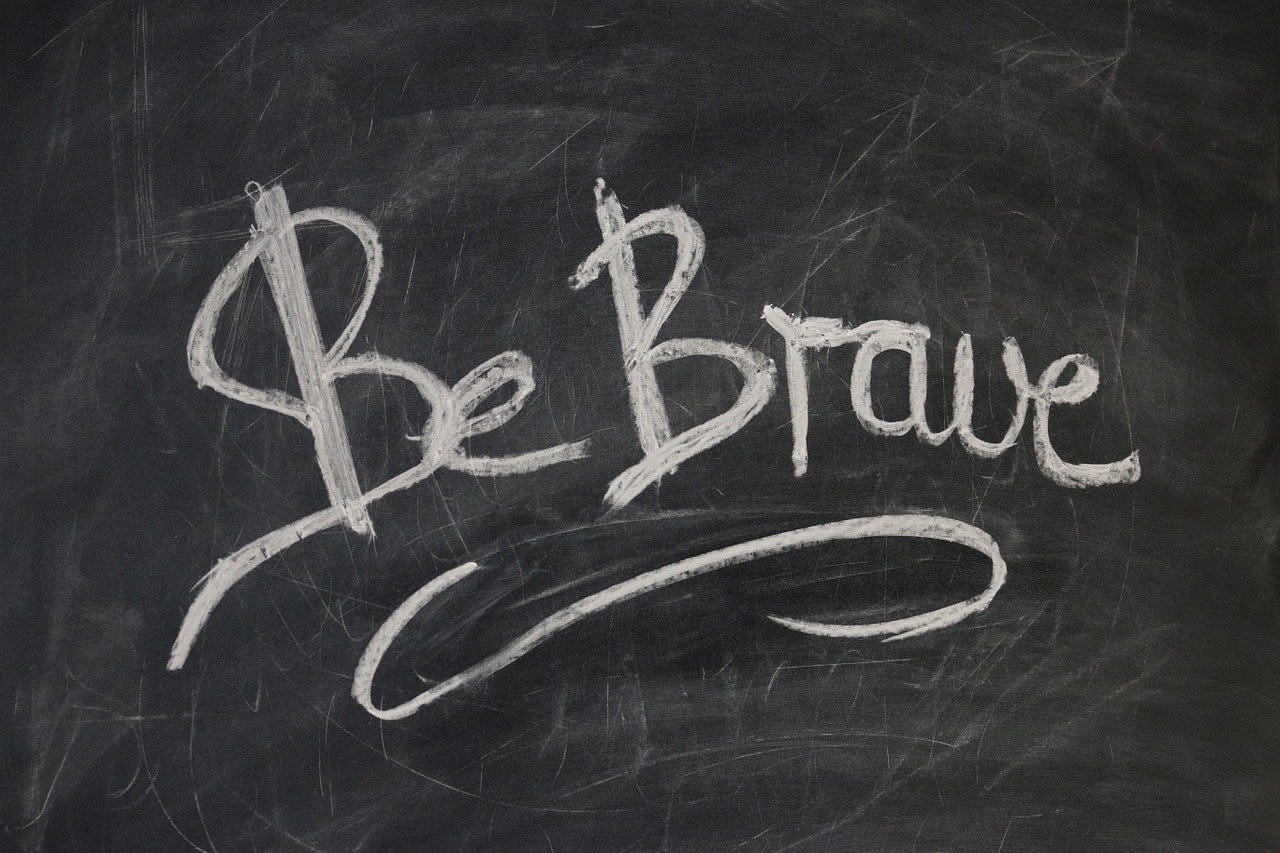
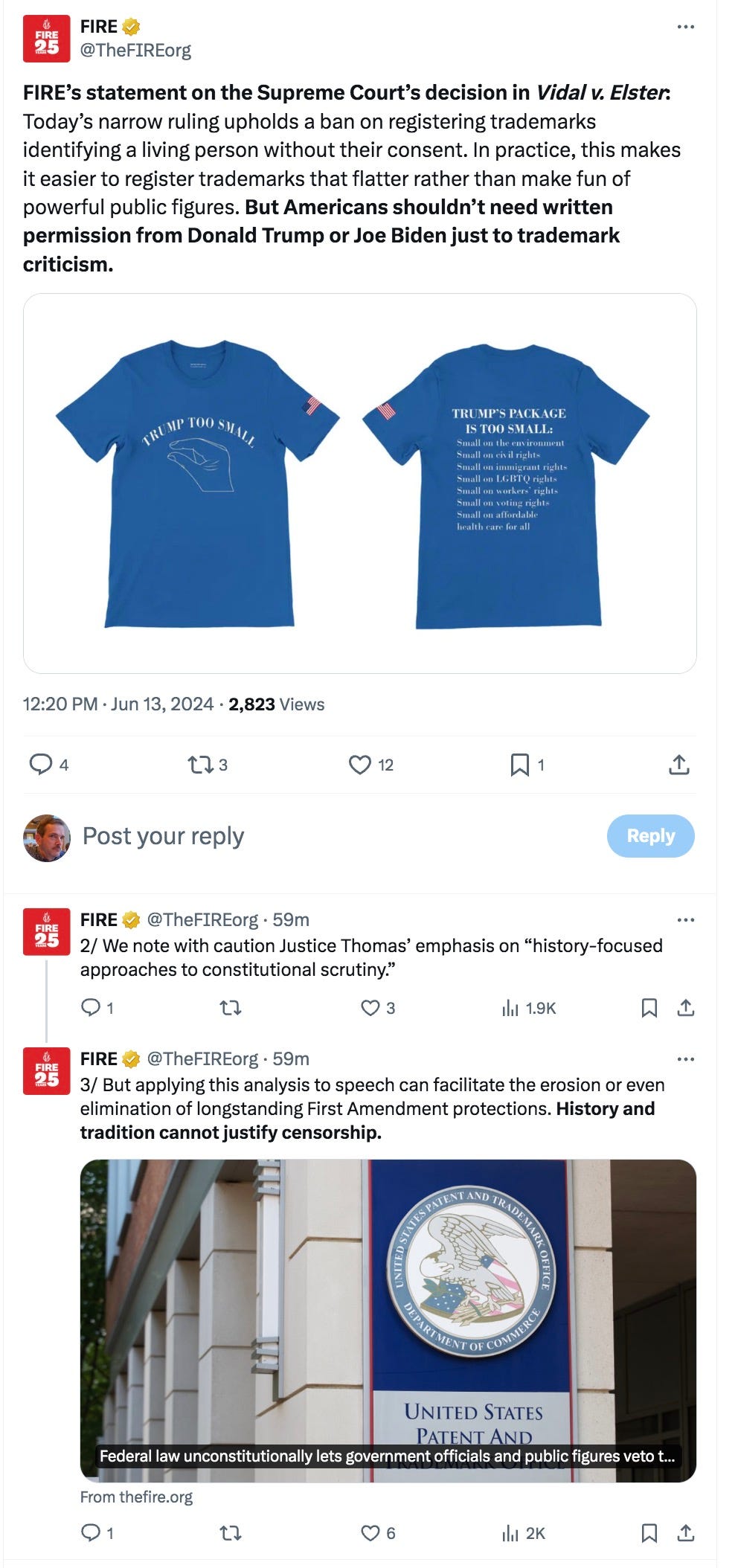
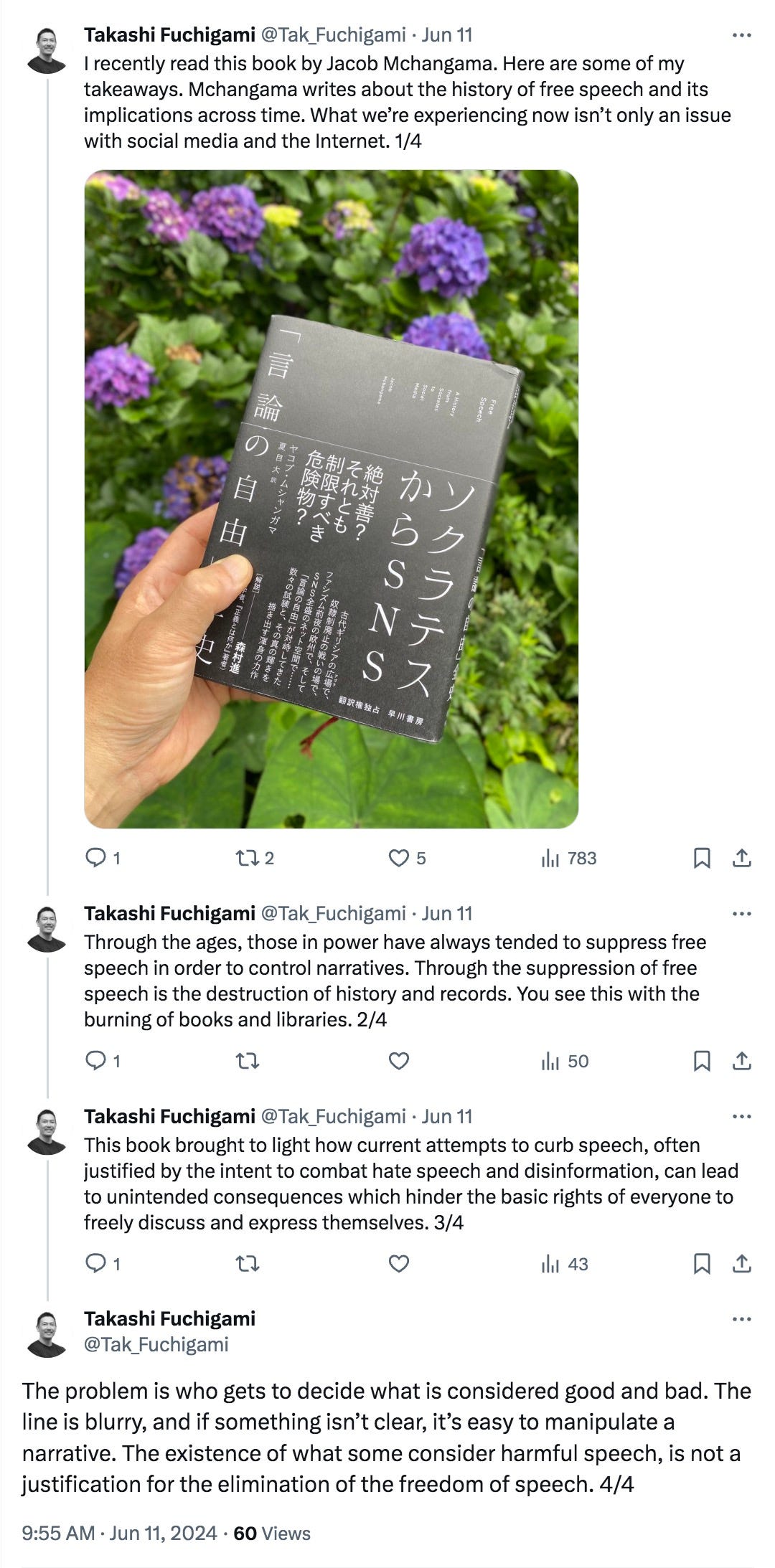
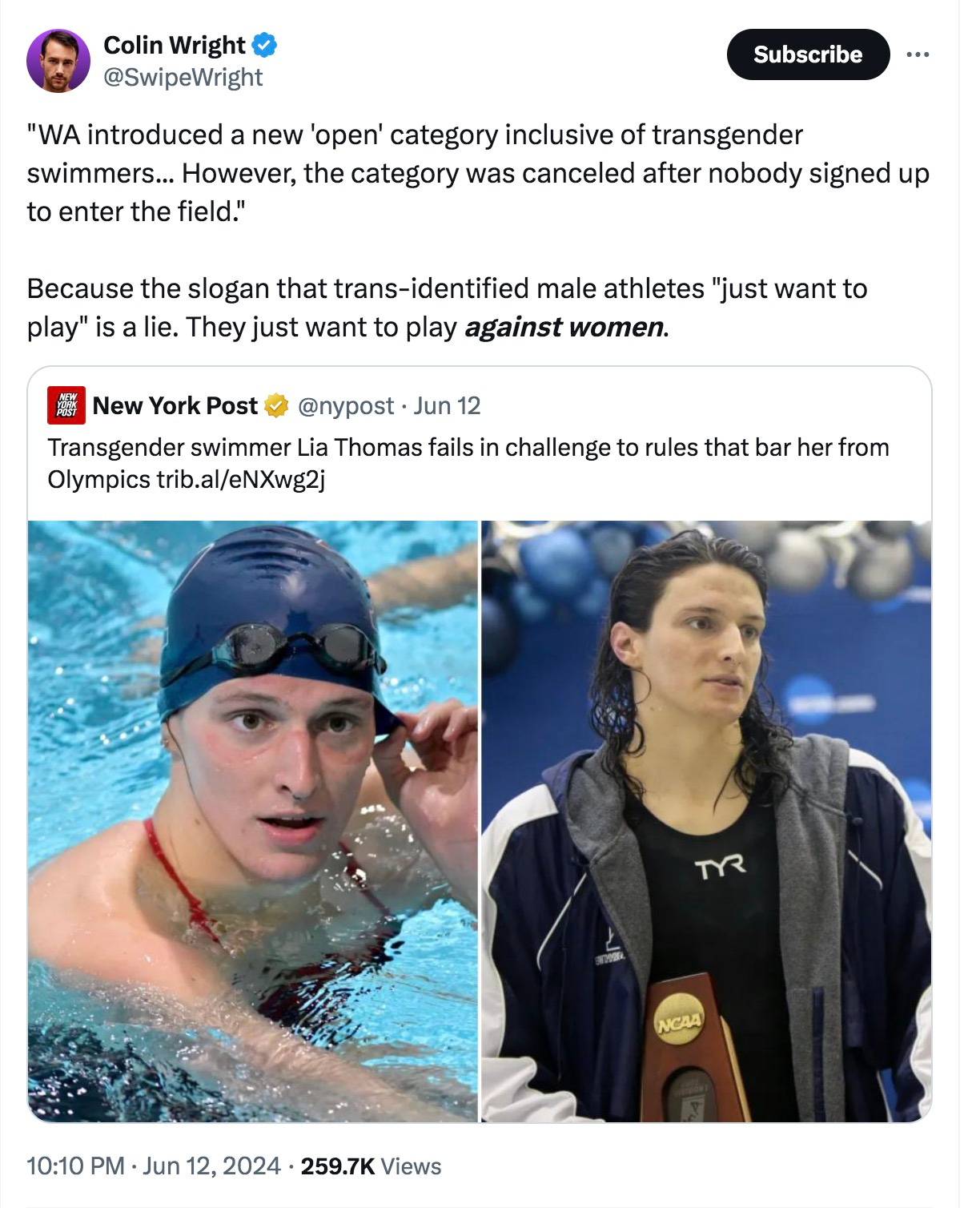
My daughter had her fill of the progressive virtue think in her English classes. When she had to recite her favorite poem, she recited Kipling's 'IF'. When she moved out, she took my century old Kipling collection with her. My son had more problems with virtue think in English than my daughter. When he had to do a paper on Macbeth, he did "The Mistakes of Macbeth, Guidance from Nicolo Machevelli" - which required a detailed reading of both Macbeth and The Prince. His English teacher was not amused - and I was not happy with his English teacher.
I stopped worrying about being called a racist long ago. My family was active in the civil rights movement - but we wanted people to be evaluated on their own merit. I am a meritocrat and I am not worried about disproportionate impact issues. I did attend urban schools that were majority poor black as well as urban schools that were majority Jewish. The issue of school quality is predominantly an issue of culture and values among the students and their families, not something inflicted by the schools themselves.
"It Is Illiberal To Charge Teens With Felonies for Vandalizing a Pride Crosswalk"
They are not being charged for vandalism, they are being charged for blasphemy.